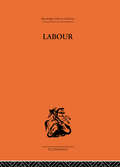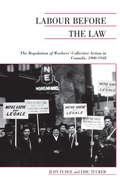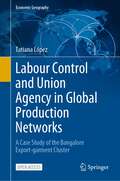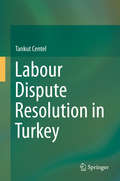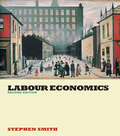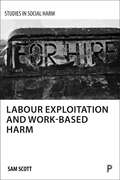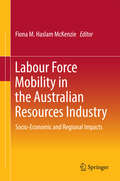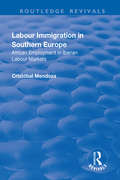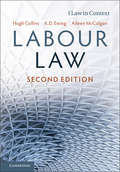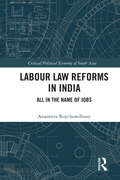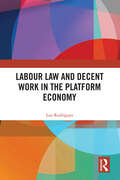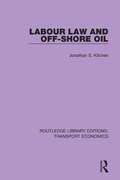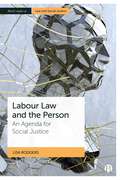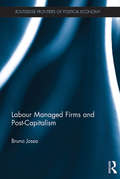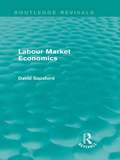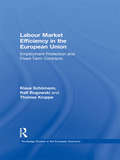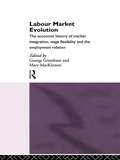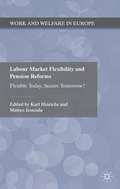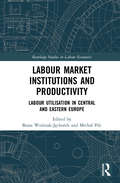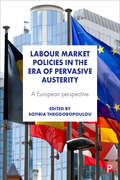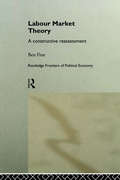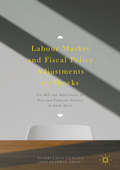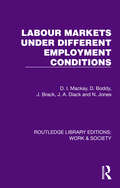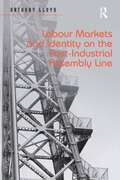- Table View
- List View
Labour
by P. Sargant FlorenceLabour focuses on the issues and problems concerning the efficient full employment of labour in a free market economy. The discussion is largely about the conditions (including comparative wages) underlying industrial efficiency and maximum production from various labour resources at least cost. By estimating man-power, analysing the human factor and measuring labour efficiency, the book summarizes recent evidence on employment conditions for or against efficiency and the effect upon the incidence of unemployment.
Labour Before the Law
by Judy Fudge Eric TuckerIn this groundbreaking study of the relations between workers and the state, Judy Fudge and Eric Tucker examine the legal regulation of workers' collective action from 1900 to 1948. They analyze the strikes, violent confrontations, lockouts, union organizing drives, legislative initiatives, and major judicial decisions that transformed the labour relations regime of liberal voluntarism, which prevailed in the later part of the nineteenth century, into industrial voluntarism, whose centrepiece was Mackenzie King's Industrial Disputes Investigation Act of 1907. This period was marked by coercion and compromise, as workers organized and fought to extend their rights against the profit oriented owners of capital, while the state struggled to define a labour regime that contained industrial conflict. The authors then trace the conflicts that eventually produced the industrial pluralism that Canadians have known in more recent years.By 1948 a detailed set of legal rules and procedures had evolved and achieved a hegemonic status that no prior legal regime had even approached. This regime has become so central to our everyday thinking about labour relations that one might be forgiven for thinking that everything that came earlier was, truly, before the law. But, as Labour Before the Law demonstrates, workers who acted collectively prior to 1948 often found themselves before the law, whether appearing before a magistrate charged with causing a disturbance, facing a superior court judge to oppose an injunction, or in front of a board appointed pursuant to a statutory scheme that was investigating a labour dispute and making recommendations for its resolution.The book is simultaneously a history of law, aspects of the state, trade unions and labouring people, and their interaction within the broad and shifting terrain of political economy. The authors are attentive to regional differences and sectoral divergences, and they attempt to address the fragmentation of class experience.
Labour Control and Union Agency in Global Production Networks: A Case Study of the Bangalore Export-garment Cluster (Economic Geography)
by Tatiana LópezThis book puts Indian garment workers and their organisations at the centre of the analysis. Taking the Bangalore export-garment cluster as a case study, the book explores the conditions that enable but also constrain the capacities of garment workers’ unions to build collective power vis-à-vis employers and thereby improve their conditions. Drawing on theoretical concepts from labour geography, relational economic geography, and Global Production Network (GPN) analysis, the book highlights, on the one hand, how the complex labour control regime in the Bangalore export-garment cluster poses manifold challenges and constraints for workers’ and unions’ collective agency. On the other hand, the book illustrates the various networked agency strategies that local garment unions in Bangalore have developed over the years to overcome these constraints by tapping into coalitional power resources from worker, consumer and labour rights organisations in the Global North.This book is therefore highly relevant for economic geographers and other scholars interested in dynamics of labour and development in GPNs as well as for unionists and labour rights activists committed to improving working conditions in the global garment industry.This is an open access book.
Labour Dispute Resolution in Turkey
by Tankut CentelThe book provides a comprehensive overview of recent developments in Turkey’s labour dispute resolution system, and helps compare the Turkish system especially with those in European countries. Turkey passed a new Labour Courts Act in 2017, which changed Turkish labour law practice by introducing mandatory mediation for all labour disputes. The main objective behind this measure was to ensure that labour disputes are resolved more quickly and less expensively. The book was written specifically for lawyers around the globe who have to deal with Turkish law, especially those who are seeking to become specialists in dispute resolution law. In addition, it provides stimulating reading for laypersons who wish to learn what 'mediation and arbitration law are all about' in Turkey. Above all, it was prepared with a view to providing foreign investors and companies in Turkey with basic information on Turkish labour legislation.
Labour Economics
by Stephen W. SmithIn the six years since the appearance of the first edition of Stephen Smith's book, labour economics has become a more firmly entrenched subject on the curriculum. Previously regarded as a subsection within industrial economics, there are now very few universities that do not devote a course to it in its own right. The focus of topics covered within it has also altered - the notion of human capital has now become much more central and microeconomic considerations are now as widely studied as macroeconomic phenomena.The second edition will address these changes and give greater centrality to microeconomics to reflect current course teaching. With superb features such as case studies, end of chapter questions and further reading sections, this new edition will prove popular with all students of labour economics.
Labour Exploitation and Work-Based Harm (Studies in Social Harm)
by Sam ScottLabour exploitation is a highly topical though complex issue that has international resonance for those concerned with social justice and social welfare, but there is a lack of research available about it. This book, part of the Studies in Social Harm series, is the first to look at labour exploitation from a social harm perspective, arguing that, as a global social problem, it should be located within the broader study of work-based harm. Written by an expert in policy orientated research, he critiques existing approaches to the study of workplace exploitation, abuse and forced labour. Mapping out a new sub-discipline, this innovative book aims to shift power from employers to workers to reduce levels of labour exploitation and work-based harm. It is relevant to academics from many fields as well as legislators, policy makers, politicians, employers, union officials, activists and consumers.
Labour Force Mobility in the Australian Resources Industry
by Fiona M. Haslam McKenzieThis book addresses the socio-economic impacts of rapid economic development due to a global mining boom. It reviews the efforts taken by communities, governments and companies in Australia to deliver enduring benefits while minimising the negative consequences of rapid growth. In particular, the effects and tensions of new workforce arrangements, worker mobility and condensed mine life cycles on communities and economies are explored. Split into two parts, the first part of the book details various issues related to the socio-economic impacts of Labour Force Mobility and Rapid Economic Growth, while the second part focuses on measuring the socio-economic impacts of Rapid Economic Growth. Chapter contributors have technical and scientific backgrounds which have been informed by social perspectives. They understand the technical and economic spheres of the resources industries and recognize the gaps in the public policy which hinder regional economic development during a period of extraordinary growth and opportunity. The book is a useful resource for practitioners in the public policy, resources, community planning and economic development sectors as well as students in business, regional planning and human resources.
Labour Immigration in Southern Europe: African Employment in Iberian Labour Markets (Routledge Revivals Ser.)
by Cristobal MendozaThis title was first published in 2003. Research on migration into southern Europe has paid little consideration to the ways of incorporating immigrants into labour markets and the impact these foreign-born workers have on local labour markets. Neither has much attention been given to the character of labour markets that enables these workers to find a job. This book fills that gap by exploring case studies of African employment in Spain and Portugal. Using cross-border perspectives, this book provides in-depth analysis of common trends across borders, such as immigrant employment in manual, low-skilled jobs, uneven immigrant involvement in labour markets, and the impact of national characteristics, economies and political environments. The result is a study which should be useful for migration specialists, economic geographers and labour market analysts alike.
Labour Law
by Hugh Collins K. D. Ewing Aileen Mccolgan Hugh Collins K. D. EwingBuilding on their successful cases and materials book, Collins, Ewing and McColgan present an entirely restructured and freshly written new textbook on employment law. Comprehensive and engaging, it combines detailed analysis and commentary on the law with short contextual extracts to fully equip the labour law student. Carefully balancing clear exposition of legal principles with critical and scholarly analysis, this is the definitive textbook on the subject written by the UK's foremost employment law scholars. The book's 20-part structure maps logically onto either a full or half module employment law course. Chapter introductions and conclusions and an uncluttered text design carefully guide the student through the material. Innovative case studies show the law 'in action' and discussion of the globalised workplace gives the work a contemporary feel. Put simply, this is required reading for all students of the subject.
Labour Law (Law in Context)
by Hugh Collins Aileen McColgan Keith EwingLabour Law offers a comprehensive and critical account of the subject by a team of prominent labour lawyers, and includes both collective labour rights and individual employment rights. By placing the law in its social, economic and political contexts, and showing how the law works in practice through case-studies, students will acquire not only a good knowledge of the law but also an appreciation of its importance and the complexity of the issues. Fully updated with recent developments in the field, the text's clear structure, logical chapter organisation, and uncluttered text design combine to make it a truly accessible way into the subject. Suitable for undergraduates and postgraduates studying UK Labour and Employment law, this book is a must-read for those wishing to excel in the field.
Labour Law Reforms in India: All in the Name of Jobs (Critical Political Economy of South Asia)
by Anamitra RoychowdhuryLabour market flexibility is one of the most closely debated public policy issues in India. This book provides a theoretical framework to understand the subject, and empirically examines to what extent India’s ‘jobless growth’ may be attributed to labour laws. There is a pervasive view that the country’s low manufacturing base and inability to generate jobs is primarily due to rigid labour laws. Therefore, job creation is sought to be boosted by reforming labour laws. However, the book argues that if labour laws are made flexible, then there are adverse consequences for workers: dismantled job security weakens workers’ bargaining power, incapacitates trade union movement, skews class distribution of output, dilutes workers’ rights, and renders them vulnerable. The book: identifies and critically examines the theory underlying the labour market flexibility (LMF) argument employs innovative empirical methods to test the LMF argument offers an overview of the organised labour market in India comprehensively discusses the proposed/instituted labour law reforms in the country contextualises the LMF argument in a macroeconomic setting discusses the political economy of labour law reforms in India. This book will interest scholars and researchers in economics, development studies, and public policy as well as economists, policymakers, and teachers of human resource management.
Labour Law and Decent Work in the Platform Economy
by Luz RodríguezThis book provides an innovative perspective on labour law within the platform economy. Exploring mechanisms for the protection of platform work, the book covers judicial decisions on the classification of platform work, collective bargaining, social protection and ownership of workers’ personal data.The global workforce is undergoing immense change, particularly in relation to technology. This book delves into the rising issue of platform workers’ personal data ownership and the equitable distribution of economic gains arising from its commercialization. Through comparing legislative frameworks and proposed laws from a diverse range of global jurisdictions, the book identifies optimal regulatory measures to safeguard the rights of platform workers. Furthermore, it analyzes in detail the European Directive pertaining to platform work and envisages the essential components of an ideal International Labour Organization (ILO) standard in this domain.The book will be of interest to students and scholars in the field of worker’s rights, the platform economy and labour law.
Labour Law and Off-Shore Oil (Routledge Library Editions: Transport Economics #13)
by Jonathan S. KitchenEconomically and politically, North Sea oil very quickly became of vital importance to Britain. But very little serious attention was paid to the problems of the men working out on the rigs, and certainly none to their legal problems: they had been working in a kind of legal ‘no man’s land’. This informative and critical book, first published in 1977, represents a new and exciting approach to labour law looks closely at the way in which the law applies to workers out on the rigs and at the way it regulates the various aspects of their employment. More than that, it looks at the context in which the law is applied, a dynamic industry operating within severe physical, economic and political constraints, showing not only how the law came to be shaped, but also how its provisions are but one example of the employment process and which mirror changing moods and standards.
Labour Law and the Person: An Agenda for Social Justice (Bristol Studies in Law and Social Justice)
by Lisa RodgersThis book aims to revitalise the link between social justice and labour law through exploring the issue of personhood and the 'subject' of the law. Rodgers argues that incorporating a more 'relational' notion of self into labour law not only provides a fresh normative perspective through which to evaluate existing labour laws, but will also make us more able to respond to labour market 'shocks' and labour market change into the future, including the introduction of AI. It is only by embedding relationality into our law that can we really respect the humanity of workers and construct a legal framework through which social justice can be achieved at work.
Labour Managed Firms and Post-Capitalism (Routledge Frontiers of Political Economy)
by Bruno JossaMarx claims that unselfishness is a child of (workplace) culture, whereas the gene is selfish. If Marx is right then the prerequisite for overthrowing capitalism is a system which both leverages selfishness and creates solidarity between workers. This book illustrates and discusses the major points of the economic theory of producer cooperatives, its evolution since the 1950s, and links with Marxian theory. Labour Managed Firms and Post-Capitalism, most importantly, demonstrates that a system of producer cooperatives offers a wealth of advantages compared to capitalism. There is general agreement that the main benefit of this form of economic democracy is that people who are allowed to freely pursue their interests are happier than those acting on somebody else’s instruction. The author argues that a system of democratic firms would eradicate classical (high-wage) unemployment and scale down both Keynesian and structural unemployment levels. He also shows that a system of producer cooperatives literally reverses the capital-labour relationship typical of capitalism and that its establishment can consequently be looked upon as a revolution. This volume is of great interest to academics, lecturers and researchers with an interest in Marxism, political economy and industrial economics, as well as economic theory and philosophy.
Labour Market Economics (Routledge Revivals)
by D SapsfordFirst published in 1981, Labour Market Economics develops the basic economic theory of introductory courses within the context of labour market analysis and applies it both to particular features and special problems of the subject. The author begins by outlining the nature of the area and the structure of the UK labour market at the time, and proceeds to explain and elaborate the tools of theoretical analysis. These are then applied in subsequent chapters to a variety of issues, including the economic analysis of trade unions, collective bargaining and the effects of unions, unemployment, wage inflation and the inequality of pay. Throughout the book, emphasis is placed on the economic theory of the labour market and the role of empirical work in testing its predictions, and wherever available, evidence from studies of the UK labour markets is cited.
Labour Market Efficiency in the European Union: Employment Protection and Fixed Term Contracts (Routledge Studies In The European Economy Ser. #No.6)
by Ralf Rogowski Thomas Kruppe Klaus SchömannThe deregulation of labour law in the European Union was thought to be a spur to lasting growth of employment and an increase in labour market efficiency. This book reveals that the results of such policies have been far from those expected.This study provides a country by country overview of the legal regulations concerning employment protection a
Labour Market Evolution: The Economic History of Market Integration, Wage Flexibility and the Employment Relation
by George Grantham Mary MacKinnonHow have modern labour markets developed? Both labour economists and economic historians agree that it is necessary to look at labour markets in their historical context. Labour Market Evolution does just this. The contributors examine the operation and development of labour markets in Western Europe and North America since 1500. They address the key questions in this complicated process using new quantitative evidence. First, how closely connected were geographically distant labour markets? Second, how flexible were markets in the past - did wages change in response to demand shocks? Did workers move across space and occupations in response to cyclical or seasonal conditions. Third, were relationships between employees and employers short-term or long-term? Why did relationships change, and what were the implications for the flexibility and integration of markets? In examining these factors, this volume draws on modern labour economic theory and up-to-date quantitative techniques to show how current traditions and systems have evolved.
Labour Market Flexibility and Pension Reforms
by Karl Hinrichs Matteo JessoulaIncreasingly flexible labour markets and reforms of old-age pension systems are still ranking high on the political agenda of European countries. This volume investigates whether, and to what extent, the interplay between pension reforms and the spread of 'atypical' employment patterns and fragmented careers has a negative influence uponeconomic security in old age. The volume, therefore, analyzes the flexibility-security nexus by focusing on the post-retirement phase, thus extending the conventional narrow concept of 'flexicurity'. The book also questions whetherreforms of public and private pension schemes compensate or aggravate the risks of increasingly flexible labor markets and atypical employment careers after retirement? Around this overarching research question, the various contributions in the volume employ the same analytical framework in order to map, and then compare, the developments in seven European countries - Denmark, Germany, Italy, the Netherlands, Poland, Switzerland, and the UK which present different labour market arrangements and various degrees of flexibility, as well as diverse pension systems.
Labour Market Institutions and Productivity: Labour Utilisation in Central and Eastern Europe (Routledge Studies in Labour Economics)
by Micha 322 Beata Wo 378 Niak-J 281 Chorek PilcThis book explains the role of formal labour market institutions in keeping the labour utilisation in Central and Eastern Europe above the level characteristic for Western European states. It provides an innovative and enriching take on labour utilisation at large and how various formal labour market institutions can affect the ongoing trend in labour utilisation in a way that is not covered by the extant literature. The impact of labour market institutions on labour market outcomes is analysed throughout 12 chapters, both from a cross-country perspective and in detailed case-studies, by 21 labour market experts from various CEE countries. Most chapters are based on empirical methods yet are presented in an easy-to-follow way in order to make the book also accessible for a non-scientific audience. The volume explores three key questions: How can labour utilisation be increased by labour market institutions? Which CEE countries managed to create a labour market institutional framework beneficial for labour utilisation? How should the labour market institutions in CEE countries be reformed in order to increase labour utilisation? The book argues that the legacy of transition reforms and a centrally planned past is still relevant in explaining common patterns among CEE countries and concludes that increasing the stock of skills accumulated by the employed and improving utilisation of these skills seems to be the first-best solution to increase labour utilisation. The book will be of interest to post-graduate researchers and academics in the fields of labour economics, regional economics, and macroeconomics as well as scholars interested in adopting an institutional analysis approach. Additionally, due to the broader policy implications of the topic, the book will appeal to policymakers and experts interested in labour economics.
Labour Market Policies in the Era of Pervasive Austerity: A European Perspective
by Sotiria TheodoropoulouThis book investigates the changing patterns of labour market and unemployment policies in EU member states during the period since fiscal austerity took hold in 2010 during the deepest postwar recession in Europe. Looking at the big European picture, do we see a convergence or a divergence in labour market and unemployment policy trends and outputs? Has labour market insecurity increased or decreased and can these changes be associated with the observed changes in labour market policies and macroeconomic conditions? Written by leading experts in the field, the book provides detailed national case studies from across the EU, which span labour market regimes and intensities of fiscal pressures to explore whether, and if so how, retrenchment or expansion have taken place across different types of labour market policies and how these changes have been distributed across the well-protected and the less well-protected labour market populations.
Labour Market Theory: A Constructive Reassessment (Routledge Frontiers of Political Economy)
by Ben FineThis book is a commanding assessment of labour market theory across the social sciences. It provides a radically original critique of labour market theory, which draws constructively but critically on existing literature. The work: * contributes to the debates on key issues in labour economics such as unemployment, gender, equal pay and the minimum theory * illustrates the policy implications in empirical studies * supplements existing orthodox labour market theory texts.
Labour Market and Fiscal Policy Adjustments to Shocks
by Eliphas Ndou Nombulelo GumataThis book focuses on the implications of the South African labour market dynamics including labour market reforms and fiscal policy for monetary policy and financial stability. Evidence suggests there are benefits in adopting an approach that coordinates labour market policies and reforms, fiscal policy, price and financial stability. In particular, the benefits of coordinating policies present policymakers with policy options in cases where they are confronted by binding policy trade-offs and dilemmas, such as in cases when there is divergence in price and financial and economic growth outcomes. The empirical insights and policy recommendations are based on different techniques that include the counterfactual and endogenous-exogenous approaches, non-linearities introduced by thresholds and the impact of persistent and transitory shock effects. Themes covered in the book include various aspects of labour market conditions and reforms and their link to inflation and inflation expectations, the impact of the national minimum wage, the interaction between public and private sector wage inflation, economic policy uncertainty and employment, government debt thresholds, sovereign yields and debt ratings downgrades, labour productivity, the impact of inflation regimes on expansionary fiscal and monetary policy multipliers, the increase in government cost of funding on price and financial stability and the link between fiscal policy and credit dynamics.
Labour Markets Under Different Employment Conditions (Routledge Library Editions: Work & Society)
by D. Boddy N. Jones D. I. Mackay J. Brack J. A. DiackOriginally published in 1971, this wide-ranging study illuminates many crucial wage and employment issues by examining the operation of local labour markets and by testing labour market theory against the observed behaviour of employers and employees in different labour market environments. It is based on an empirical investigation of engineering plants both in major conurbations and in smaller labour market areas. There is an emphasis on measurement and quantification, which provides a fund of information on such subjects as wage structures, labour turnover, recruitment and mobility, internal labour markets, manpower forecasting, apprentice training and redundancy. The authors outline the weaknesses of applying economic theory to labour market behaviour.
Labour Markets and Identity on the Post-Industrial Assembly Line
by Anthony LloydAs a product of its time, the call centre utilises new developments in telecommunications and information technology to offer cost-efficient delivery systems for customer care. Efficiency, productivity and flexibility are all embodiments of neoliberal market capitalism and are all personified in the call centre operation, as well as the structure of the labour market in general. Thus the individual and the workplace are embedded in a variety of global processes. In order to frame the context in which call centre operations exist today and their employees (mainly young men and women) negotiate the increasingly risky and individualised task of developing an identity or sense of belonging in the world, Labour Markets and Identity on the Post-Industrial Assembly Line sets out the economic, social and political changes over the last three decades that have restructured the labour market, altered the balance between labour, management and the state, and unleashed global market capitalism upon previously sheltered areas of the economy and social life in both Britain and elsewhere. This ground-breaking book offers one of the first real qualitative sociological investigations of a relatively new form of employment, to see what life is like on the 'post-industrial assembly line', whilst also taking a close look at the nature of class, identity and subjectivity in relation to young people coming of age in a world dramatically altered over the last three decades.
